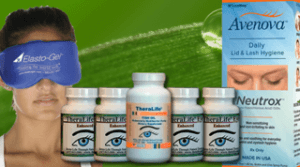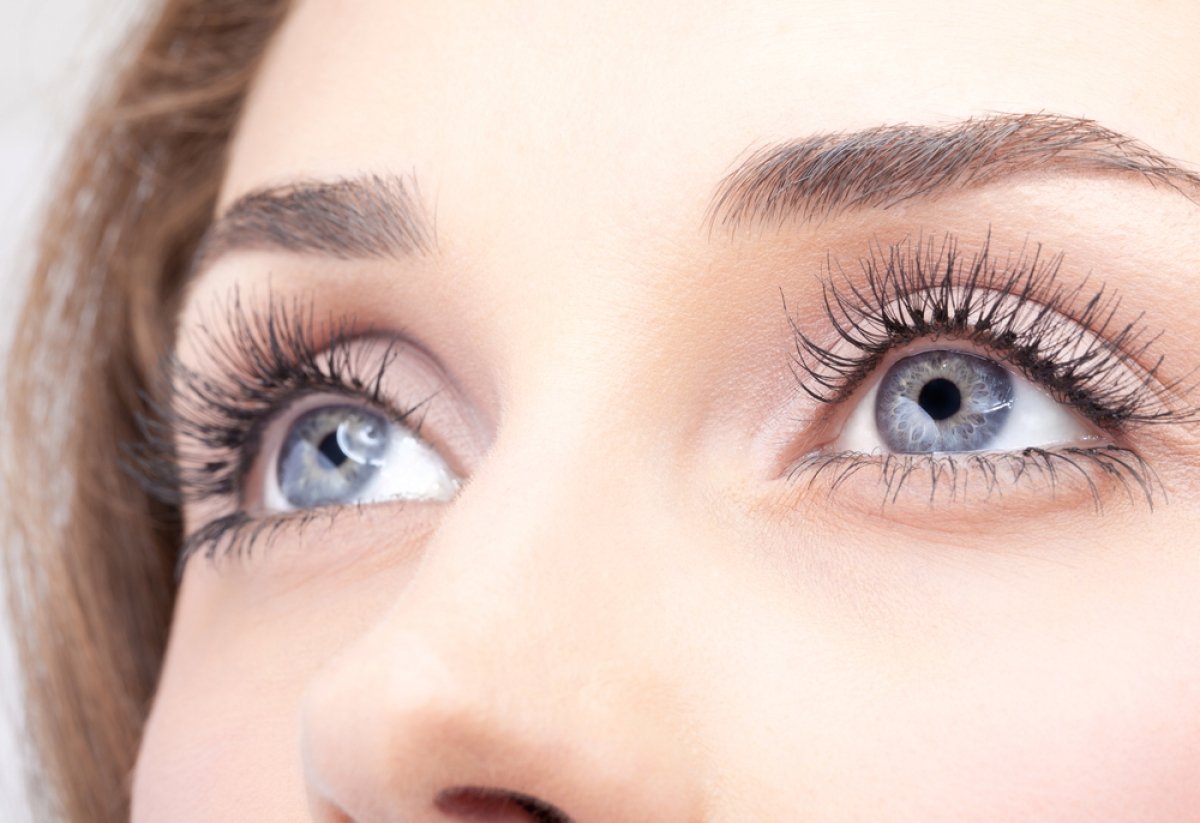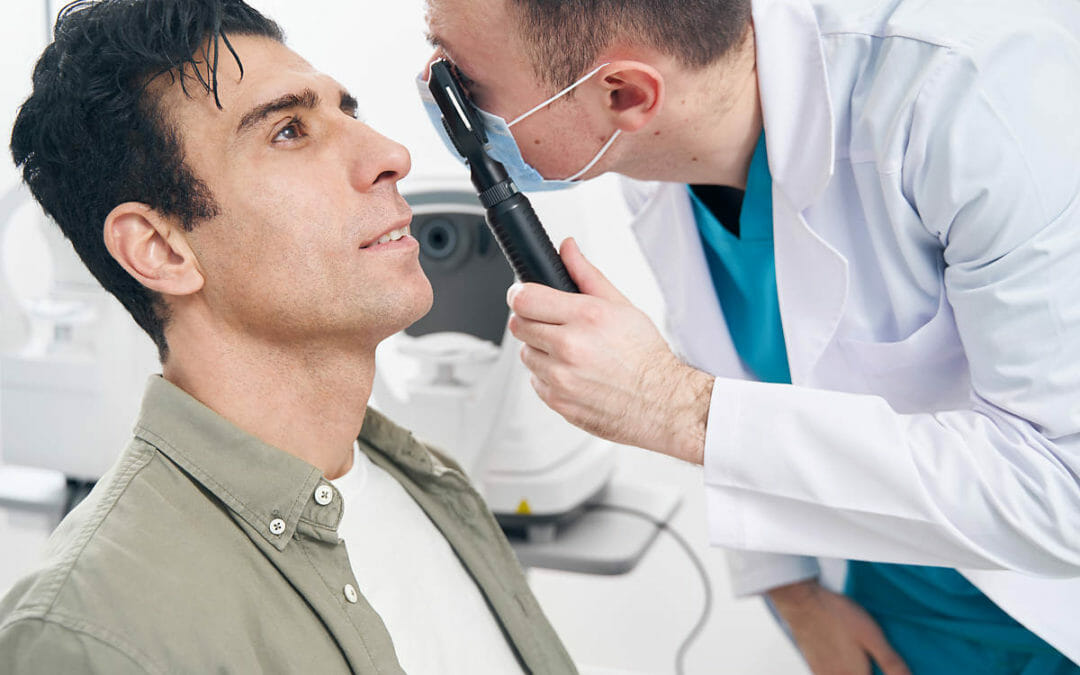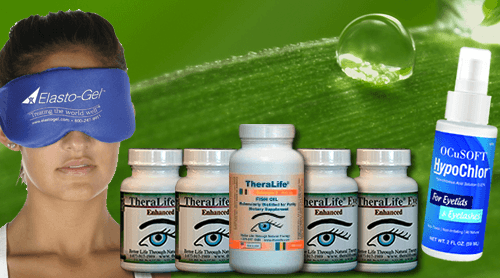The All Natural TheraLife Eye Protocol That Works – Multi- Facet Approach To Get Fast Recovery
Theralife treats dry eyes, meibomian gland dysfunction, blepharitis, all at the same time to achieve optimum result for faster recovery
The combination consists of 4 bottles of TheraLife Eye capsules, 1 fish oil, 1 hot compress and 1 Avenova eyelid cleanser.

Stop meibomian gland dysfunction, blepharitis, Chronic Dry Eyes with TheraLife. Oral treatment that works.
Customer Stories
Severe Chronic Dry Eyes Blepharitis/MGD, Ocular Rosacea Relief by TheraLife Eye
I was diagnosed with Blepharitis and Meibomian Gland Dysfunction and have had terrible dry eyes for the past year since I started menopause. I tried all sorts of drops,fish oil, evening primrose oil, and Vit. E and uses warm compress daily with no results. I use computers at work which did not help. My dry eyes are definitely having a negative effect on my life and I do worry about the long-term effects of damaging my corneas. I am nearly 48 years old.
I started using TheraLife Eye plus Menopausal Support according to the directions. After 3 months, my eyes are feeling quite a lot better. I continue to use a heated eye bag and clean my eyelid margins each night, but I rarely use any eye drops during the day.
Yours thankfully. A.W- Australia
Introduction
Meibomian gland dysfunction (MGD) is a common eye condition, affecting millions of people worldwide. It can cause symptoms such as dry eyes, blurred vision and light sensitivity. While there are treatments available to manage MGD, many prefer to take a natural approach to managing their symptoms. This article explores the potential of essential oils and herbal supplements to help treat MGD naturally.
Natural remedies have become increasingly popular in recent years, with studies showing that certain essential oils and herbal supplements may provide relief from symptoms associated with MGD. Essential oils are plant-based compounds that contain active ingredients that can help reduce inflammation and promote healing. Herbal supplements are made from natural ingredients like herbs, vitamins and minerals that may offer therapeutic benefits as well.
This article will discuss the potential of essential oils and herbal supplements to treat MGD naturally and provide an overview of some of the most commonly used remedies for this condition. We will also explore the safety considerations associated with these treatments so readers can make an informed decision about what type of treatment is best for them.
Definition
Meibomian gland dysfunction (MGD) is a common condition affecting the eyelids and tear film of millions of people worldwide. According to the American Academy of Ophthalmology, MGD affects more than 10 million Americans each year. It occurs when the meibomian glands, located in the eyelids, become blocked or do not produce enough oil for proper tear film production. This can cause symptoms such as dry eyes, irritation and blurry vision.
To understand what MGD is, it is important to know about the normal functioning of the meibomian glands. These glands are located in both upper and lower eyelids and secrete an oily substance called meibum that helps keep tears from evaporating too quickly. Without proper lubrication from these glands, a person’s eyes may become dry and irritated. Additionally, without a healthy tear film to protect the eye from bacteria and other irritants, vision can become blurred or distorted.
Therefore, it is essential that individuals with MGD take measures to ensure proper functioning of their meibomian glands so they can maintain their eye health and comfort. Understanding what causes MGD is the first step towards managing this condition naturally through lifestyle changes and herbal supplements.
Causes Of Meibomian Gland Dysfunction
Meibomian gland dysfunction (MGD) is a common ocular disorder that can lead to many symptoms such as dry eye, irritation, and redness. Understanding the causes of MGD is important for managing the condition more effectively. The following are some of the common causes of MGD:
1. Eyelid inflammation: Blepharitis and other inflammatory conditions such as rosacea or seborrheic dermatitis can cause MGD since they cause swelling of the eyelids and blockage in the oil glands.
2. Environmental factors: Exposure to allergens or pollutants in the air can also lead to MGD due to irritation of the eyes and eyelids.
3. Hormonal changes: Changes in hormones during pregnancy or menopause may cause an increase in oil production leading to MGD.
4. Oil gland blockage: Blockages due to debris, bacteria, or other substances on the eyelids can prevent oil from draining properly, leading to MGD.
The effects of these causes can vary depending on an individual’s age, gender, lifestyle, and medical history. Therefore, it is essential for individuals who have been diagnosed with MGD seek professional advice from their eye care provider to determine the best treatment plan for them. Additionally, understanding these causes can help individuals reduce their risk for developing MGD by making lifestyle changes or avoiding certain environmental factors that could trigger it. With this knowledge in hand, individuals with MGD may be able to take proactive steps towards better management of their condition and improved vision health overall.
Symptoms Of Meibomian Gland Dysfunction
Painful, persistent problems plague the eyes of those suffering from Meibomian Gland Dysfunction (MGD). Symptoms of MGD include dry eyes, eye discomfort, eyelid redness, compromised tear film quality, and light sensitivity. To better understand the impact of MGD on ocular health, consider the following table that outlines different symptoms and their associated effects.
Symptom and effects
- Dry Eyes – Irritation & Inflammation
- Eye Discomfort – Blurry Vision & Itching Sensations, Eyelid Redness , Swelling & Tenderness .
- Compromised Tear Film Quality – Watery Eyes & Burning Sensations,| Light Sensitivity, Headaches & Squinting .
Left untreated, these symptoms can lead to a deterioration in overall ocular health and an uncomfortable decrease in visual acuity. With proper management however, MGD can be treated effectively and its symptoms alleviated. Practitioners recommend lifestyle modifications such as wearing sunglasses outdoors and avoiding hot environments to reduce light sensitivity; rehydrating with artificial tears or lubricants to improve tear film quality; and using warm compresses over closed eyes for several minutes each day to reduce blepharitis or eyelid redness. Herbal supplements and essential oils are also widely used to manage MGD symptoms naturally.
By understanding the key symptoms of MGD and how they affect ocular health, individuals can determine the best course of action for managing this common condition. With preventative measures in place and treatment options available, those suffering from MGD can look forward to improved vision and comfort soon after diagnosis.
Diagnosis And Testing
When managing Meibomian Gland Dysfunction (MGD), it is important to receive proper diagnosis and testing from an eye specialist. Here are four ways to test for MGD:
1. Diagnostic Imaging: This includes a slit-lamp examination and meibography, which uses infrared light to detect any blockages in the gland openings.
2. Tear Film Test: The tear film is examined with a slit-lamp microscope using dyes or stains to detect any abnormalities.
3. Lipid Layer Thickness Test: A special device measures the thickness of the lipid layer of the tear film, which helps determine whether there is an imbalance of oils in the eyes.
4. Blepharitis Assessment: This is done by measuring lid margin inflammation, which can indicate MGD if present.
Once diagnosed with MGD, it is important to discuss treatment options with an eye specialist as soon as possible to help prevent vision damage and other complications associated with this condition. With a clear understanding of how MGD affects vision and overall health, it can be managed more effectively through natural remedies such as essential oils and herbal supplements. Moving forward, we will explore the potential benefits of these natural remedies for MGD treatment.
Benefits Of Essential Oils For Meibomian Gland Dysfunction Treatment
Essential oils have long been used in traditional and alternative medicine for a variety of ailments. With respect to treating meibomian gland dysfunction (MGD), essential oils are often recommended as part of an overall treatment plan including lifestyle changes, herbal supplements, and other therapies. Essential oils can provide relief from the symptoms associated with MGD, such as dry eyes, redness, and itching. They can also reduce inflammation and help restore the natural balance of the meibomian glands.
The most commonly used essential oils for MGD treatment are lavender, chamomile, rosemary, and tea tree oil. Lavender oil has anti-inflammatory properties that help to reduce inflammation in the eye area. It is also known to be calming and relaxing which helps relieve stress and tension which can cause MGD flare-ups. Chamomile has anti-inflammatory and antibacterial properties which make it beneficial for reducing redness and irritation in the eyes caused by MGD. Rosemary oil helps to reduce inflammation while also promoting circulation in the eye area which aids in healing the meibomian glands. Lastly, tea tree oil has both antiseptic and anti-inflammatory properties that can soothe irritated eyes due to MGD while helping to prevent further damage from occurring.
Essential oils offer an effective way to treat MGD without having to use medications or other more invasive treatments. They are safe, natural remedies that can be used alongside lifestyle changes such as avoiding smoking and using a humidifier to keep the air moist at home or work environment. While essential oils may not completely cure MGD on their own, when combined with other treatments they can greatly improve symptoms of this condition. Types of herbal supplements used in conjunction with essential oils for treating MGD will be discussed in the next section.
Types Of Herbal Supplements Used
Herbal supplements are becoming increasingly popular for the treatment of Meibomian Gland Dysfunction (MGD). There are a variety of herbal and nutritional supplements that can be used to alleviate the symptoms associated with MGD. These include omega-3 fatty acids, beta-carotene, vitamins A, C and E, as well as herbs such as chamomile, green tea extract and ginkgo biloba.
Omega-3 fatty acids have been shown to reduce inflammation in the eyelids and improve tear production. Studies have also shown that omega-3 fatty acids may help reduce the risk of dry eye syndrome. Beta-carotene is an antioxidant that helps reduce oxidation damage in the eyes due to oxidative stress caused by free radicals. Vitamins A, C and E are essential for healthy vision and can help improve eye health.
Herbs such as chamomile, green tea extract and ginkgo biloba can also be beneficial for MGD treatment. Chamomile has anti-inflammatory properties which can help reduce inflammation in the eyelids. Green tea extract is rich in antioxidants which can help protect the eyes from oxidative stress caused by free radicals. Ginkgo biloba is known for its ability to improve circulation throughout the body, including to the eyes which can help improve eye health.
These herbal supplements are generally considered safe when taken according to recommended dosages; however, it is important to consult a healthcare professional before taking any supplement or herbal remedy as they may interact with other medications or treatments being taken. With proper guidance, these natural remedies may offer a safe alternative for treating MGD without resorting to pharmaceutical medications.
How To Use Essential Oils And Supplements Safely
When it comes to managing Meibomian Gland Dysfunction (MGD) naturally, essential oils and herbal supplements are powerful tools. However, safety is of the utmost importance when using these treatments. The following provides information on how to use essential oils and herbal supplements safely for MGD treatment.
The first step in safe usage is understanding the potential risks associated with each treatment option. With essential oils, it is important to keep in mind that their potency and concentration can vary widely depending on the type of oil used, as well as the method of application. Ingestion may also cause adverse reactions or interactions with existing medications. For example, a case study conducted by the American College of Naturopathic Medicine suggests that peppermint oil should not be ingested by individuals with GERD or gastritis due to its potential for causing gastro-esophageal reflux. Similarly, certain herbal supplements may interact negatively with existing medications or have other adverse effects if taken in large doses or over an extended period of time. It is therefore important to consult a qualified practitioner prior to beginning any new supplement regimen.
Additionally, when using essential oils topically, it is necessary to dilute them properly before applying them directly to the skin. Oils that are too concentrated can cause irritation and even burns if applied directly without being diluted first. Furthermore, it is important to remember that some essential oils may cause photosensitivity when exposed to direct sunlight and should be avoided during periods of intense sun exposure.
Finally, do not forget that proper diet and lifestyle changes are also key components for achieving successful outcomes when treating MGD naturally. By taking these precautions and consulting a qualified health care provider prior to beginning any new supplement regimen or course of treatment involving essential oils, individuals can greatly reduce their risk of experiencing any negative side effects from their MGD management plan.
Diet And Lifestyle Changes For Improved Results
The dietary changes and lifestyle modifications recommended for managing meibomian gland dysfunction naturally are simple, yet effective. Eating a healthy diet that is rich in essential vitamins and minerals can support overall eye health, which can promote meibomian gland health as well. Increasing consumption of omega-3 fatty acids with foods like fish and nuts can help to stimulate the production of lipids (oils) by the glands. In addition, eating foods with antioxidant properties, such as fruits and vegetables, may reduce inflammation in the eyelids and aid in maintaining good meibomian gland health.
Getting enough restful sleep each night is also important for promoting meibomian gland health. Stress has been linked to an increase in the expression of inflammatory cytokines and decreased tear production, which can lead to dry eyes or ocular discomfort. Therefore, it is important to maintain a healthy balance between work and leisure activities to minimize stress levels. Finally, avoiding environmental irritants such as smoke or pollution may also be beneficial for improving meibomian health.
By making dietary changes and lifestyle modifications that focus on promoting overall eye health, individuals may be able to improve their symptoms associated with meibomian gland dysfunction naturally. These natural remedies are generally safe and effective but should always be discussed with an eye care professional before implementing them into one’s daily routine.
Possible Side Effects And Risks
While essential oils and herbal supplements can have numerous benefits for managing Meibomian Gland Dysfunction (MGD), there are also potential side effects and risks associated with their use. It is important to be aware of these before starting any natural treatment plan.
MGD-related Side Effects, Risks Associated with MGD, Adverse Reactions to MGD
- Skin irritation or an allergic reaction-
- Possible drug interactions
- Eye redness, dryness or stinging sensation
- Upset stomach or nausea
- Medication misuse and overuse
- Blurred vision or double vision
- Headache, dizziness or insomnia
- Contamination of the product with bacteria or fungi
- Corneal epitheliopathy (inflammation)
- Increased heart rate or blood pressure
- Infection caused by contaminated product
- Eyelid swelling and discomfort
When considering any natural treatment for MGD, it is important to talk to your doctor beforehand in order to assess possible drug interactions. Even though essential oils and herbal supplements are generally considered safe, they can still cause adverse reactions in some people. Common side effects include skin irritation, upset stomach, headache, dizziness, increased heart rate or blood pressure, insomnia, as well as eye redness, dryness or stinging sensation. In rare cases, contamination of the product with bacteria or fungi may lead to a serious infection called corneal epitheliopathy. Other serious complications include blurred vision and double vision as well as eyelid swelling and discomfort.
It is therefore critical that all persons interested in using essential oils and herbal supplements for managing MGD do so only under the guidance of their healthcare provider. This will help prevent medication misuse, overuse and other risks associated with these natural treatments. By following these precautions it is possible to ensure safety while still benefiting from the potential therapeutic properties of essential oils and herbal supplements for managing Meibomian Gland Dysfunction naturally.
Long-Term Management Strategies
As shown in the previous section, there are various potential side effects and risks associated with managing meibomian gland dysfunction (MGD). However, these can be minimized and even avoided altogether by taking a holistic approach to long-term management strategies. With the proper combination of natural treatments and lifestyle changes, MGD can be managed effectively without resorting to costly medications or invasive procedures.
The first step to managing MGD is to make sure that the underlying cause of the condition is properly addressed. This includes addressing any underlying health issues such as allergies, diabetes, thyroid conditions, or autoimmune diseases which may be contributing to MGD symptoms. Additionally, it is important for individuals with MGD to take steps to reduce inflammation throughout the body by avoiding foods that trigger allergic reactions and incorporating anti-inflammatory supplements into their diet.
In addition to dietary modifications, incorporating herbal supplements into one’s treatment plan is another strategy for managing MGD naturally. Herbal supplements such as omega-3 fatty acids, turmeric curcumin, probiotics and green tea extract have been shown to help reduce inflammation in the eyes and improve meibomian gland health. Additionally, certain essential oils have also been found to be beneficial for managing MGD symptoms by reducing inflammation in the eyelids and improving tear production. Some of the most effective essential oils for MGD include lavender oil, rosemary oil and chamomile oil.
By combining dietary modifications with herbal supplements and essential oils tailored specifically towards improving meibomian gland health, individuals suffering from MGD can significantly reduce their symptoms while preventing future flare-ups of the condition. Taking a proactive stance towards managing this condition through natural methods will ensure optimal eye health now and in the years ahead.
Frequently Asked Questions
Are There Any Long-Term Effects Of Using Essential Oils And Herbal Supplements To Treat Meibomian Gland Dysfunction?
When it comes to the long-term effects of using essential oils and herbal supplements to treat meibomian gland dysfunction (MGD), there is a lack of scientific evidence to support any conclusions. However, there are many anecdotal reports that suggest these natural remedies may be beneficial for treating MGD over the long term.
Research into the use of essential oils and herbal supplements for treating MGD has so far been inconclusive. Some studies suggest that essential oils may have anti-inflammatory properties and may contribute to reducing inflammation associated with MGD. Other studies have found some potential benefits from herbal supplements such as omega-3 fatty acids or olive leaf extract in helping to reduce symptoms related to MGD.
Overall, more research is needed to fully understand the potential long-term effects of using essential oils and herbal supplements as treatment for MGD. It is important that individuals speak with their healthcare provider before starting any new supplement regimen, as certain medications or conditions could interact negatively with these natural remedies. Furthermore, if symptoms persist or worsen, further medical evaluation should be sought out in order to determine an appropriate course of action.
What Is The Best Way To Use Essential Oils And Herbal Supplements Safely?
The use of essential oils and herbal supplements to treat meibomian gland dysfunction (MGD) can bring with it a plethora of benefits, but only when done safely. Knowing the best way to use these natural remedies is key to ensuring lasting results with little risk. To that end, this article will discuss the importance of safe essential oil and herbal supplement use in MGD treatment.
Incorporating essential oils and herbal supplements into one’s health regimen can be an intimidating prospect. After all, these items are not regulated by the FDA and thus require an extra level of care when using them for MGD. For starters, it is important to research any product thoroughly before usage. This includes reading up on reviews from credible sources and consulting a doctor or other healthcare professional if possible; safety should always come first! It is also wise to take note of any potential interactions between the products and any medications one may be taking as well as allergies that could play a part in how effective they are for MGD treatment.
Moreover, when it comes to actually using essential oils and herbal supplements, there are certain precautions that should be taken into consideration. For instance, it is important to never ingest either type of product unless specifically directed by a doctor or other healthcare professional; many products contain compounds which could cause serious harm if ingested in large amounts. Additionally, while topical application is usually safe with these products, it is important to test them out on a small patch of skin first in order to identify any potential irritations or allergic reactions they might cause. Finally, when diffusing essential oils via aromatherapy devices, one should ensure that the device itself has been properly maintained as per manufacturer instructions so as not to damage the device or spread unsafe levels of vaporized oil into the air.
By following these steps for researching products beforehand and taking necessary safety precautions upon usage, individuals can make sure that their experience with natural products in treating MGD goes as smoothly as possible without fear of unintended consequences on their health or well-being. With this approach in mind, those seeking natural remedies for MGD will have peace of mind knowing they are both safe and effective at managing the condition long-term.
Are There Any Specific Dietary Changes That Could Help Manage Meibomian Gland Dysfunction?
When considering the management of meibomian gland dysfunction (MGD), one important factor is diet. Dietary changes can have a significant impact on MGD symptoms and are often recommended to patients looking for natural solutions to their condition. There are various dietary changes that can be implemented to help manage MGD, such as avoiding certain foods or eating more of certain foods.
Research has shown that certain foods may exacerbate MGD symptoms while other foods may provide beneficial effects when consumed regularly. Foods that may worsen MGD symptoms include dairy products, processed carbohydrates and sugar, and greasy or fried foods. On the other hand, consumption of omega-3 fatty acids, lean proteins, and fresh fruits and vegetables may help reduce inflammation and improve overall eye health.
In addition to these dietary changes, it is also important to ensure adequate hydration by drinking plenty of water throughout the day. Adequate hydration helps prevent dryness in the eyes which can contribute to MGD flare-ups. Additionally, limiting alcohol intake can also be beneficial for those looking to manage their condition naturally through diet. By making these simple dietary modifications, it is possible to improve symptoms associated with MGD without relying on medications or supplements.
Are There Any Other Treatments Or Management Strategies For Mgd Aside From Essential Oils And Herbal Supplements?
According to a recent survey, nearly four out of every five people suffer from meibomian gland dysfunction (MGD). This condition is characterized by the inflammation of the glands and can lead to a variety of uncomfortable symptoms, such as dry eyes and irritation. Although essential oils and herbal supplements have been linked to helping manage MGD naturally, it is important to ask if there are any other treatments or management strategies available.
When it comes to managing MGD, lifestyle modifications can be an effective first step. Limiting the amount of time spent on digital devices, avoiding smoking and drinking alcohol in excess, and eating a balanced diet rich in omega-3 fatty acids can all help to reduce symptoms. Additionally, warm compresses may be used to relieve discomfort associated with MGD.
There are also several natural remedies that have shown promise in managing MGD. Taking flaxseed oil supplements has been associated with reducing inflammation in the meibomian glands. Similarly, consuming fish oil has been linked to decreasing dry eye symptoms and improving tear production. Finally, regular use of topical lid scrubs may help clear away blocked glands and provide relief from discomfort caused by this condition.
Overall, although essential oils and herbal supplements are often recommended for managing MGD naturally, there are other treatments and management strategies available as well. Lifestyle changes such as limiting digital device use, avoiding smoking or drinking alcohol in excess, eating a balanced diet rich in omega-3 fatty acids, using warm compresses regularly, taking flaxseed oil supplements, consuming fish oil regularly, or using topical lid scrubs are all potential options for managing this condition naturally.
Are There Any Potential Side Effects Or Risks Associated With Using Essential Oils And Herbal Supplements For Mgd Treatment?
When considering the potential use of essential oils and herbal supplements for the treatment of Meibomian Gland Dysfunction (MGD), it is important to consider any potential side effects or risks associated with such treatments. While essential oils and herbal supplements are often touted as natural remedies for a variety of health conditions, including MGD, there can be serious consequences if not used properly.
When using essential oils for MGD treatment, it is important to take into consideration any potential side effects. Some common side effects include skin irritation, allergic reactions, and possible toxicity from ingestion. It is also important to note that applying essential oils directly to the skin can damage the sensitive tissues in the eye area, so it must be done with caution and only under the guidance of an experienced practitioner. Long-term use of certain essential oils may also lead to an accumulation of chemicals in the body that can impact overall health.
Herbal supplements may also pose a risk when used for MGD treatment, particularly if they are combined with other medications or taken without consulting a qualified healthcare professional first. Possible side effects include digestive issues, liver damage, and allergic reactions. Additionally, certain herbs may interact with other substances in ways that could be harmful to one’s health.
It is, therefore imperative for those considering using essential oils or herbal supplements for MGD treatment to consult a qualified healthcare provider prior to taking any action. This will help ensure safety and effectiveness while minimizing potential risks or side effects associated with these treatments.
* Potential Side Effects/Risks:
* Essential Oils:
* Skin irritation
* Allergic reactions
* Toxicity from ingestion
* Damage to sensitive eye tissues (if applied directly)
* Accumulation of chemicals in body from long-term use
* Herbal Supplements:
* Digestive issues
* Liver damage
* Allergic reactions
* Interaction with other substances
When choosing to utilize essential oils or herbal supplements as part of an MGD treatment plan, it is important to consider all available evidence regarding safety and efficacy before proceeding. Doing so can help minimize risk while ensuring desired results are achieved safely and effectively over time.
How do you fix meibomian gland dysfunction?
The most common way to fix meibomian gland dysfunction is to use warm compress to melt the clogging, then clean eyelids with an eyelid cleanser. Cleaning with baby shampoo does not work. You must treat dry eyes at the same time or this condition becomes chronic.
What is the root cause of meibomian gland dysfunction?
Root cause of meibomian gland dysfunction is the obstruction of the oil glands located on your eyelids. This obstruction stopped the flow of normal lubrication to thicken your tears, thus causing evaporative dry eyes. This obstruction is caused by chronic dry eyes, that is why treating dry eyes at the same time will help you recover faster.
Can meibomian gland dysfunction be cured?
Conclusion
MGD is a common condition that can be effectively managed through the use of essential oils and herbal supplements. While these natural remedies are generally safe, it is important to understand how to use them correctly and safely. Additionally, dietary changes such as increasing intake of omega-3 fatty acids or reducing consumption of refined sugars may be beneficial in managing MGD symptoms. Other treatment strategies such as using warm compresses or avoiding eye makeup may also help reduce symptoms.
It is important to note that there are potential side effects associated with using essential oils and herbal supplements for MGD treatment. Therefore, individuals should consult with a healthcare professional before starting any new treatment plan for MGD. For example, one case study demonstrated that a woman experienced an allergic reaction after using an essential oil blend specifically formulated to treat her dry eyes caused by MGD. As a result, she had redness and burning sensation in her eyes which resolved after discontinuing the product.
In conclusion, while essential oils and herbal supplements can be effective in managing MGD symptoms, it is important to remember that they come with potential risks and side effects. Therefore, individuals should always consult their healthcare provider before beginning any new treatment plan for MGD.




